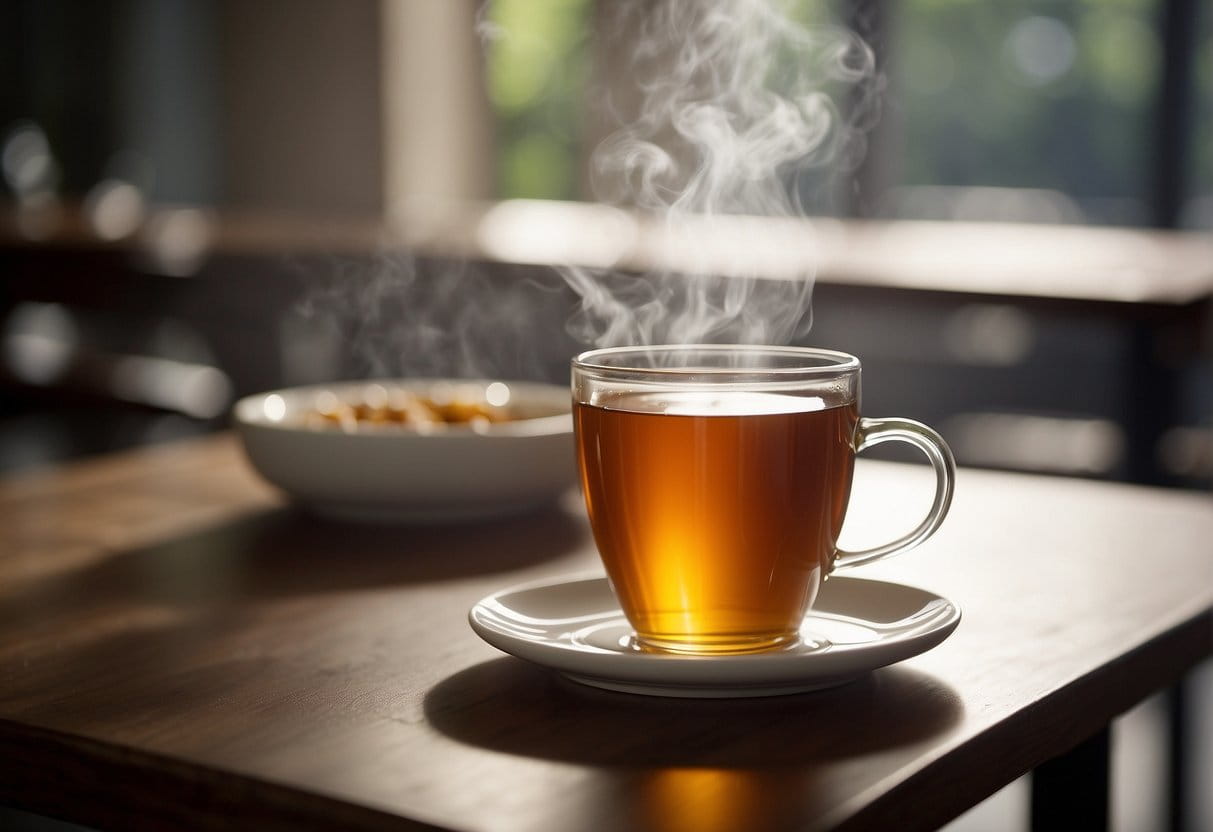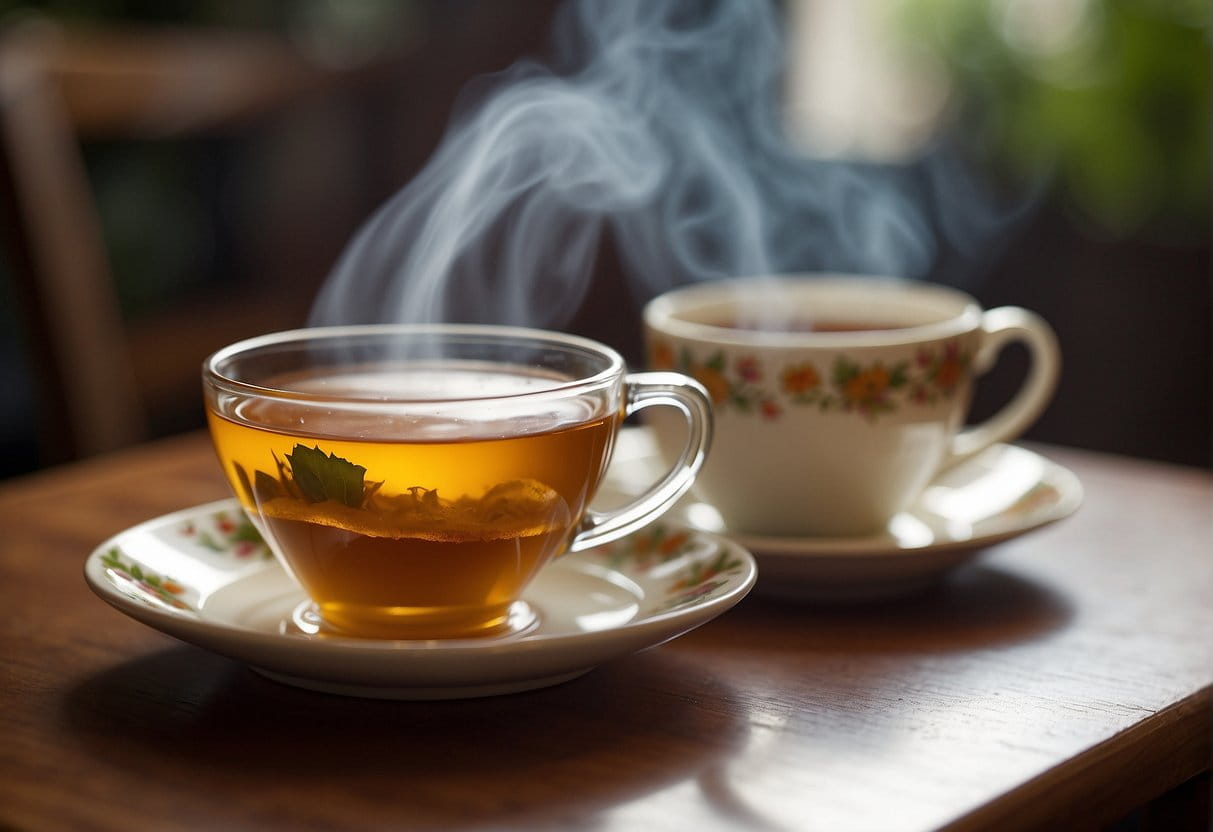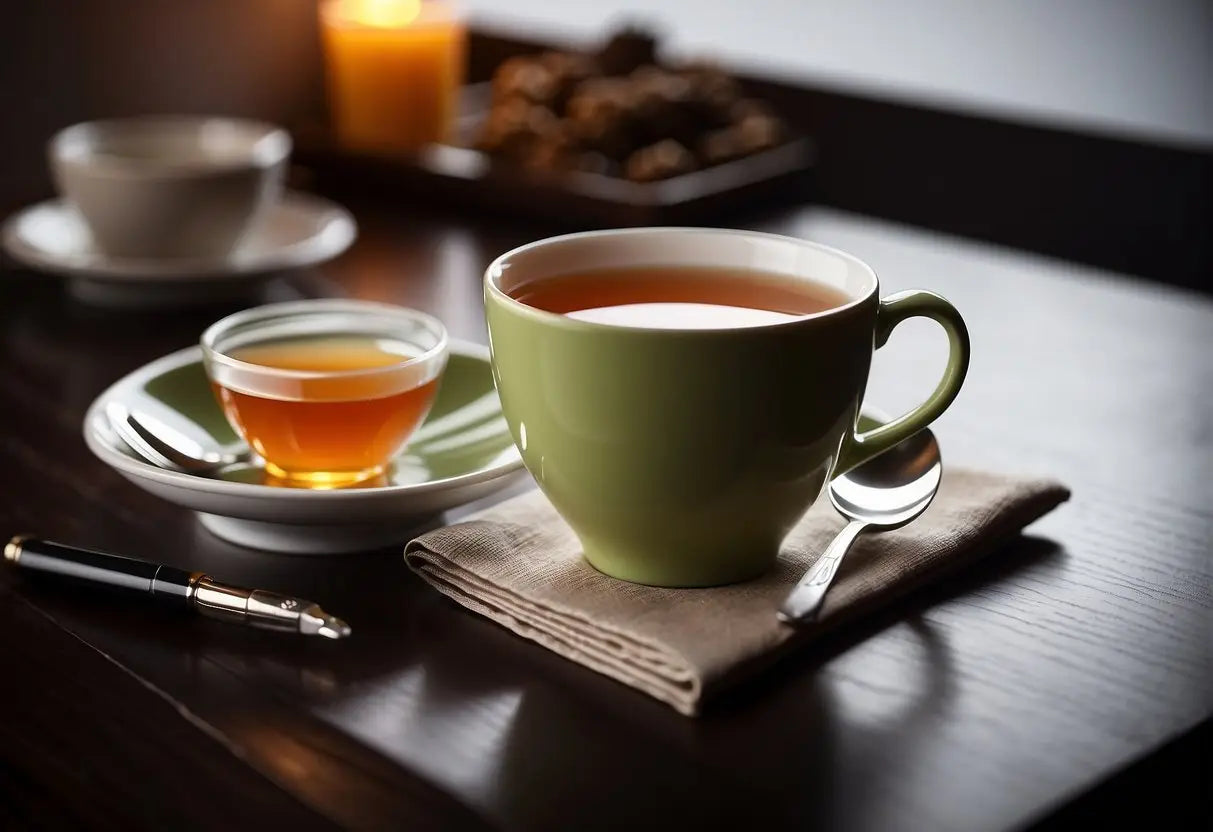How Many Calories in a Cup of Tea
Consuming a cup of tea can be a virtually calorie-free experience, or it can add a notable number of calories to your diet, depending on what is added to the tea.
Plain Tea
Your cup of plain tea, whether it be black, green, white, or herbal, usually contains 2 calories or fewer per cup. This minimal calorie count is true for tea brewed from loose leaves or tea bags and served without any additions.
Tea with Additives
When you add sweeteners or milk, the calorie content of your cup of tea increases:
Bestsellers
- Sugar: Adding one teaspoon of sugar to your tea introduces about 16 calories.
- Honey: One tablespoon of honey in your tea adds around 64 calories.
-
Milk:
- Skim milk adds roughly 5 calories per tablespoon.
- Whole milk adds about 9 calories per tablespoon.
Additionally, commercial flavored tea beverages often contain added sugars, which can significantly increase the calorie content. Always check labels for specific calorie information.
Factors Affecting Calorie Count

The calorie content in your cup of tea can vary significantly based on several factors, such as the type of tea, the amount you pour, and what you might add to it.
Type of Tea
The type of tea leaves used can influence the calorie count. For instance:
- Black tea: Generally has about 2 calories per cup.
- Green tea: Slightly lower, with approximately 2 calories per cup as well.
- Herbal tea: Usually contains less than 2 calories per cup, depending mainly on the specific herbs used.
Serving Size
Calorie content is directly proportional to the serving size:
- 8 oz cup: The standard serving size for tea, containing the calorie counts mentioned above.
- Larger servings: Will naturally increase the calorie count in direct proportion to the increase in volume.
Additions and Variations
What you add to your tea has the most significant impact on calorie count:
-
Sugar:
- 1 tsp: Adds about 16 calories.
- 2 tsp: Doubles the count to 32 calories.
-
Honey:
- 1 tbsp: Introduces around 64 calories.
-
Milk:
- 1 tbsp skim milk: Adds about 5 calories.
- 1 tbsp whole milk: About 9 calories.
-
Cream:
- 1 tbsp: Can add around 52 calories.
Note: These additions can quickly escalate the total calorie count of your tea.
Calorie Comparison
A cup of tea typically contains 2 calories when enjoyed plain, without additives like sugar or milk. Compared to other popular beverages, tea offers a low-calorie option which may be significant if you're conscious about your caloric intake.
Tea vs. Other Beverages
- Plain Tea: 2 calories per cup
- Black Coffee: Around 2 calories per cup
- Soft Drink (Cola): Approximately 100 calories per cup
- Orange Juice: Around 112 calories per cup
- Whole Milk: Approximately 150 calories per cup
Your choice of beverage can impact your daily calorie consumption. Beverages such as soft drinks and juices contain higher amounts of calories mainly due to their sugar content. If your preference leans towards a low-calorie intake, tea and black coffee are comparable and minimal in comparison. Milk provides more calories, reflecting its nutrient density.
Health Considerations

When considering the health aspects of drinking a cup of tea, it's important to note that its calorie content is typically low, which can be beneficial for weight management.
Benefits of Low-Calorie Tea
- Caloric Content: A plain cup of brewed tea usually contains less than 2 calories, which is almost negligible in a standard diet.
- Hydration: Tea contributes to your daily fluid intake without adding calories, thus maintaining hydration without weight gain.
Considerations for Weight Management
- Additives and Calories: Be mindful of what you add to your tea. Milk, sugar, honey, or cream can increase the calorie count substantially.
- Balanced Diet: Incorporate low-calorie tea as part of a balanced diet. It should complement, not replace, nutrient-rich foods.
Measurement Methods
When analyzing the caloric content of your cup of tea, precision is key.
Lao Ban Zhang
Caloric Measurement Techniques
Direct Calorimetry: This technique measures the energy content by directly observing the heat released when a substance, such as tea, is burned. The amount of heat correlates to the calories present. It requires specialized equipment, typically a bomb calorimeter, which consists of an insulated chamber within which the sample is combusted.
Indirect Calorimetry: Rather than burning the sample, this method estimates calories by measuring oxygen consumption and carbon dioxide production. As tea is a liquid, its caloric content can also be inferred indirectly from its components, using known energy values for each element.
Estimating Caloric Values
Standardized Data Tables: These are comprehensive resources that compile average caloric values for various foods and beverages, including tea. You can check these tables to obtain a rough estimate of calories without conducting any tests.
Nutrient Databases: Various databases are available that provide caloric information which can be accessed to determine the caloric content of your tea. These databases often take into account the type of tea and any additives like sugar or milk.
Record Keeping

Effective record keeping is essential to monitor your calorie intake from tea consumption accurately.
Logging Tea Intake in Calorie Tracking
When you record your tea consumption, it's important to note the type of tea and any additives like milk or sugar. These additions can significantly increase the calorie count. For example, a cup of plain black tea typically contains 2 calories; however, adding a teaspoon of sugar adds 16 calories, and a tablespoon of whole milk adds 9 calories.
-
Plain Tea:
- Black tea: 2 calories
- Green tea: 2 calories
- Herbal tea: 0 calories
-
Additives:
- Sugar (1 tsp): 16 calories
- Whole milk (1 tbsp): 9 calories
Record each cup of tea in your calorie tracker as follows:
- Date & Time: Note when you consume the tea.
- Type of Tea: Specify the kind of tea - black, green, herbal.
- Additives: List any sugar, milk, or other additions with their quantities.
- Total Calories: Calculate the sum of the tea and additives.
By maintaining a precise log, you ensure that your calorie tracking is accurate, helping you stay on top of your dietary goals.
Frequently Asked Questions
Tea can be a low-calorie beverage, but variations in preparation can significantly alter its calorie content. Here's what you need to know.
What is the calorie count of a cup of tea with skimmed milk?
A cup of tea with skim milk generally contains about 10 calories, depending on the amount of milk you add.
How does adding milk and sugar affect the caloric content of tea?
Adding milk to your tea adds around 20 to 30 calories per tablespoon, while every teaspoon of sugar introduces approximately 16 calories.
Can you compare the calorie content of black tea versus tea with milk?
Black tea contains 2-3 calories per cup, whereas tea with about a quarter cup of milk adds roughly 30 to 50 calories, depending on the fat content of the milk used.
What is the calorie difference between a cup of tea with and without sugar?
A cup of unsweetened tea typically has less than 5 calories, but adding a teaspoon of sugar will increase the calorie content by about 16 calories.
How does the caloric content of a regular cup of tea compare to a cup of coffee?
A regular cup of black tea has fewer calories than a cup of black coffee, with tea at 2-3 calories per cup and coffee at about 2-5 calories, excluding any additives.
What are the calories in a traditional Indian tea with sugar?
A traditional Indian tea, or chai, with two teaspoons of sugar, contains around 40-60 calories per cup, mostly due to the added milk and sugar.
← Older post Newer post →











